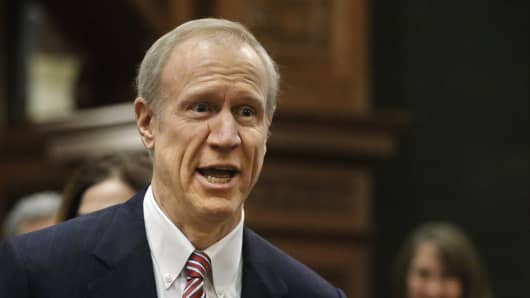Illinois Governor Acts to Curb Power of Public Sector Unions
Monica Davey and Mitch Smith
The New York Times
CHICAGO — Gov. Bruce Rauner, the newly elected Republican who has often criticized public sector unions, took his first step toward curbing their power on Monday by announcing an executive order that would bar unions from requiring all state workers to pay the equivalent of dues.
Mr. Rauner, who faces a Democratic-controlled legislature with strong ties to labor, took the unilateral step saying that he believed those fees violate the United States Constitution.
Read MoreHow unions can harm economy:Expert
''Forced union dues are a critical cog in the corrupt bargain that is crushing taxpayers,'' Mr. Rauner said. ''An employee who is forced to pay unfair share dues is being forced to fund political activity with which they disagree. That is a clear violation of First Amendment rights -- and something that, as governor, I am duty bound to correct.''

Seth Perlman | AP
Illinois Gov. Bruce Rauner.
Mr. Rauner, a former private equity manager who became the state's first Republican governor in more than a decade, is following otherRepublican governors in the Midwest who have aggressively taken on public sector unions in recent years.
Those include Mitch Daniels of Indiana, who ended collective bargaining by state workers by executive order; Scott Walker of Wisconsin, who led efforts to cut collective bargaining rights for most public employees; and Rick Snyder of Michigan, who signed legislation ending the requirement that all workers in unionized workplaces pay union dues.
More from The New York Times:
For Chief Justice, Battling in God's Name Is Nothing New
Former CIA Officer Released After Nearly Two Years in Prison
Oregon:Governor Relents on Scrutiny of Fiancée
For Chief Justice, Battling in God's Name Is Nothing New
Former CIA Officer Released After Nearly Two Years in Prison
Oregon:Governor Relents on Scrutiny of Fiancée
The governor's executive order affects about 6,500 of the state employees who are not in unions but currently pay fees in lieu of union dues. The American Federation of State, County and Municipal Employees said that about 42,000 state employees are represented by unions.
But labor leaders say Mr. Rauner's intent is far broader, aimed at shrinking union membership in the future and diminishing labor's power in Illinois. Union leaders have described the fees, often called ''fair share'' payments, as reasonable contributions from workers who, while choosing not to be union members, still benefit from collective bargaining agreements.
Read MoreUS West Coast port operations resume
The order does not affect private sector unions or state employees who choose to be in unions. A spokesman for the governor said that the executive order would take effect immediately but that the money from the union fees would be placed in escrow in case the order was challenged in the courts.
Last week, in his first State of the State address, Mr. Rauner called for the state to ban political contributions by public employee unions to ''the public officials they are lobbying, and sitting across the bargaining table'' from, as well as allow local governments to enact ''right to work'' laws. Those laws typically abolish the practice of making both union membership and dues-paying automatic in unionized workplaces and have often led to declines in union ranks.
''Bruce Rauner's scheme to strip the rights of state workers and weaken their unions by executive order is a blatantly illegal abuse of power,'' said Roberta Lynch, executive director of Afscme Council 31. ''Perhaps as a private equity C.E.O., Rauner was accustomed to ignoring legal and ethical standards, but Illinois is still a democracy and its laws have meaning.''
''It is crystal clear by this action,'' she continued, ''that the governor's supposed concern for balancing the state budget is a paper-thin excuse that can't hide his real agenda: silencing working people and their unions who stand up for the middle class.''
Afscme, which is set to negotiate a contract with the state this year, is one of many unions that backed Mr. Rauner's Democratic opponent in last year's election.
Patrick Semmens, a spokesman for the National Right to Work Committee, said Monday's action could be seen as a natural progression from recent victories in nearby states. ''There will inevitably be a union battle on this,'' he said, ''but we're excited this is bringing this issue to the forefront.''
Still, the order covers only state employees, he said, and an expansion of the policy to both public and private sector workplaces would be difficult.
''We'd like to see Illinois become a right-to-work state,'' he said. ''Obviously, you need more than just the governor to get that done.''
Some critics of the governor said it was clear why he had chosen to make an executive order rather than offer a legislative proposal. The state's legislative chambers are controlled by Democrats, many of whom have received union support over the years. On Monday evening, the reaction from legislative leaders seemed surprisingly tempered.
''Our legal staff is reviewing the governor's executive order regarding fair share,'' said the Senate president, John Cullerton, a Democrat. ''At the same time, I look forward to hearing the governor's budget as we search for common ground to address our fiscal challenges.''
Bob Bruno, director of the labor education program at the University of Illinois at Urbana-Champaign, said the governor's action was an aggression against public unions in a state where organized labor's influence runs deep. That said, he questioned the legal justification for the measure and its practical effect, noting that most eligible state employees are union members.
''In principle, it's a pretty serious assault. In terms of impact, it remains to be seen because it's a relatively small percentage of the population that's chosen fair share,'' Mr. Bruno said. ''This is an assault on the institutional existence of the union in the public sector, and these sorts of fights are historic fights and have big impact.''
No comments:
Post a Comment